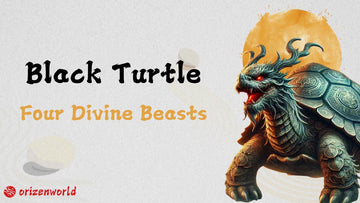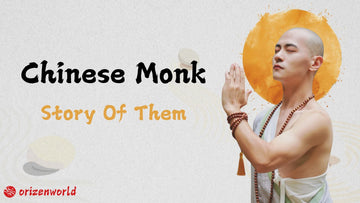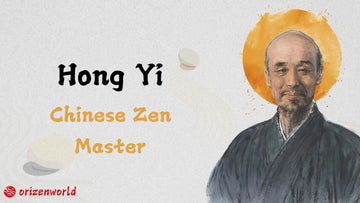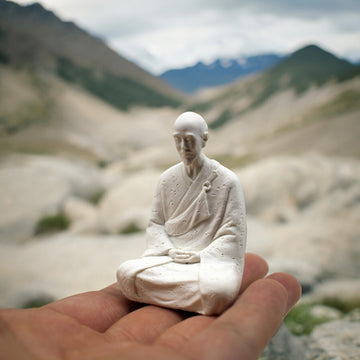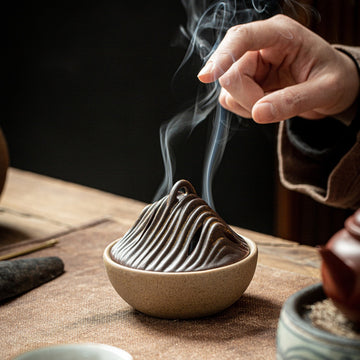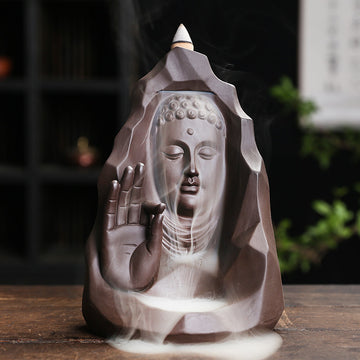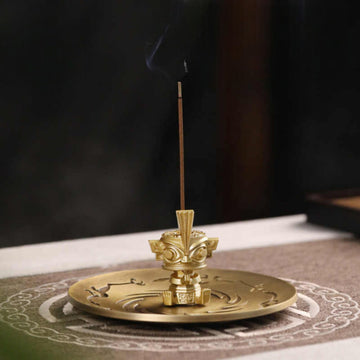The Black Turtle, or Xuanwu, is one of the Four Symbols but tends to be less noticed compared to the Azure Dragon and White Tiger. Like the turtle it represents, Xuanwu has a more low-key presence. However, its cultural significance and role in Feng Shui are incredibly important. Xuanwu symbolizes protection, endurance, and stability, playing a crucial part in harmonizing energies. In this article, let's explore its deep cultural meaning and how it is used in Feng Shui to bring balance and protection.
Xuanwu, also known as the Black Turtle, is one of the Four Symbols in Chinese mythology. Its origins can be traced back to ancient star worship and the division of the twenty-eight lunar constellations. Xuanwu represents the northern direction in the Four Symbols, associated with the seven stars of the Northern Mansion. In the system of the Five Elements, Xuanwu corresponds to water and the trigram of Kan, symbolizing the old yin, and is linked to winter, the season of deep and cold energy.
Initially, Xuanwu was represented solely by a black tortoise, with no snake element. However, during the Han Dynasty, its image began to evolve. The tortoise, known for its symbolism of protection, longevity, and strength, was paired with a snake, creating the combined tortoise-snake figure. This transformation reflects the fusion of totemic beliefs and astronomical observations in ancient China. The snake, symbolizing adaptability and transformation, added a layer of complexity to Xuanwu's representation.
The combination of the tortoise and snake in Xuanwu’s imagery is highly symbolic. The tortoise represents stability, endurance, and protection, while the snake embodies flexibility, movement, and change. This duality suggests Xuanwu as both a steadfast guardian and a force capable of transformation. The evolution of Xuanwu's imagery reflects broader cultural shifts and the integration of various symbolic elements from both mythology and early astronomical practices.
Xuanwu holds a significant position in Chinese culture, symbolized by the tortoise, which is known for its long lifespan. This embodiment reflects multiple symbolic meanings, including longevity, wisdom, protection, and the northern direction. The combination of the tortoise and snake in Xuanwu’s image symbolizes both longevity and wisdom, with the tortoise representing long life and the snake associated with intelligence and transformation. As a guardian spirit, Xuanwu is revered as a protector who brings stability and tranquility.
In Taoism, Xuanwu is worshipped as Zhenwu Dadi or Xuantian Shangdi, the guardian deity of the north. He is believed to govern the feng shui and energy of the northern direction, helping to stabilize and balance environmental forces. This belief is deeply rooted in Taoist practices and folklore, where Xuanwu is regarded as a powerful deity offering protection from disasters and calamities, ensuring peace and harmony.
Xuanwu’s influence also extends into folk beliefs, where his presence is thought to ward off evil spirits and bring good fortune. His role in both Taoism and folk religion underscores his importance as a protective and stabilizing force. In the next chapter, we will delve deeper into Xuanwu’s unique significance in feng shui, exploring how his presence influences the flow of energy in different environments.
Xuanwu, like the Qinglong and Baihu in feng shui, plays a crucial role in ensuring the stability and protection of a space. Its influence in feng shui is manifested in several key aspects:
Back Mountain Design: In feng shui, Xuanwu is often associated with the concept of "back mountain," which means that the area behind a house or office should have a tall, solid support structure to provide strong backing and protection. This design enhances the stability and support of the space. The idea is similar to having a giant tortoise behind you, offering a sense of security—this is known as the "tortoise mountain theory."
Water Element and Wealth: Xuanwu is closely linked with the water element, which symbolizes wealth and the flow of energy. In feng shui, placing water features such as ponds, fountains, or water walls in the northern area of a space (such as the north side of the living room) can introduce the water element. This activates the flow of energy, promoting the attraction of wealth and enhancing the positive energy in the space.
Counteracting Negative Energy and Protection: As a guardian deity, Xuanwu plays an important role in neutralizing harmful energy. In feng shui, Xuanwu can effectively ward off negative energies from external sources, such as sharp corners, direct roadways, or tall buildings. By placing decorative items that symbolize Xuanwu—such as statues, paintings, or totems—in the northern part of a space, you can strengthen its protective function and neutralize any harmful influences, ensuring a balanced and harmonious environment.
In feng shui, determining the position of Xuanwu requires a flexible analysis based on the specific context of the space.
Traditional Homes and Courtyards: For traditional homes or courtyards, the Xuanwu position is typically located at the rear of the house. To determine this, face away from the front door and the Xuanwu position is directly behind you. For example, in a house facing south, the northern side is the Xuanwu position, while the southern side corresponds to the Zhuque position. If there is a natural hill or building behind the house, this aligns with the feng shui principle of "backing the mountain."
Modern Apartments: In modern buildings, the Xuanwu position is often determined by referencing the front door or the main source of natural light. Stand inside, with your back to the front door or main window, and the Xuanwu position is directly behind you. For instance, if the front door faces east, the western side will be the Xuanwu position. The presence of tall buildings or mountains behind the home can further enhance the stability and energy of the Xuanwu position.
Influence of Terrain: In complex terrain, it is essential to assess the surrounding environment. For example, if the house is on a hillside with a high mountain behind, the mountain direction becomes the Xuanwu position. In flat areas, artificial landscaping, such as artificial hills or walls, can be used to reinforce the energy of the Xuanwu position.
In feng shui, the Xuanwu position plays a crucial role in providing stability and balance to a space. There are several methods to enhance its energy, from adjusting the layout to incorporating specific items that align with feng shui principles. Here are practical ways to improve the Xuanwu position.
Strengthening the Backing Mountain
One of the most effective ways to enhance the Xuanwu position is by adding items that symbolize the "mountain" behind. Objects such as large stones, tall cabinets, or jade can help strengthen the energy of the Xuanwu position. These items are believed to attract helpful people and enhance career prospects. By reinforcing the Xuanwu position with these symbols, you create a stable foundation for both personal and professional growth.
Adjusting the Home Layout
If the Xuanwu position is affected by unfavorable elements like an open or exposed area, such as being near a bathroom or large plant, adjustments should be made. It’s essential to clear away negative sources that may be harming the Xuanwu energy. Moving obstructive items or rearranging furniture to restore balance and positive flow is crucial in maintaining a harmonious space.
Using Feng Shui Figurines
Placing feng shui figurines, such as a peach wood beast head or a bagua mirror, at the Xuanwu position can help dissipate negative energy. These items are believed to have the power to neutralize harmful influences, providing protection and promoting a peaceful environment.
Incorporating Wealth Symbols
To enhance prosperity, placing wealth symbols like gemstones, coins, or gold ingots at the Xuanwu position can improve financial luck. These items are considered auspicious and attract wealth energy, helping to create a more abundant atmosphere.
Adding Water Elements and Plants
Since the Xuanwu position is associated with the water element, incorporating water-related objects like flowing water paintings, waterfall pictures, or fish tanks can boost its energy. Similarly, placing green plants in this area adds vitality and positive energy, which promotes a harmonious and thriving living environment. Greenery can also enhance the overall atmosphere of the space, contributing to a sense of tranquility and happiness.
Xuanwu symbolizes a lifestyle that embraces nature, advocating for the presence of small hills or mounds and clear ponds or flowing water. This reflects a profound philosophy of harmony with the natural world, emphasizing balance and tranquility in one’s surroundings.
In today’s fast-paced urban life, we have spent too much time in concrete jungles, gradually distancing ourselves from nature. As a result, the Feng Shui aspect associated with Xuanwu has been somewhat disrupted. While some may dismiss Feng Shui as mere superstition, its fundamental principle—living in harmony with nature—remains universally valuable.
This is precisely why people often feel the urge to escape from the overwhelming hustle and bustle of city life, seeking refuge in suburban or rural environments. By immersing ourselves in a space where nature flourishes, we not only improve our living conditions but also restore balance to our physical and mental well-being.
The wisdom of Xuanwu reminds us that a home should not only provide shelter but also serve as a bridge between humans and nature. Whether or not one fully embraces Feng Shui, the pursuit of a harmonious living environment enriched by natural elements is an aspiration worth cherishing. In nature’s embrace, we rediscover serenity, clarity, and a renewed sense of life.

